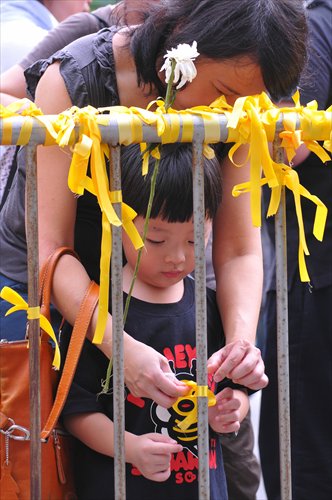Hong Kong's cautious action
By Ling De in Hong Kong Source:Global Times Published: 2014-3-13 0:58:02

A boy in Hong Kong makes a tie to mourn eight compatriots who died in the Manila hostage incident on August 29, 2010. Photo: CFP
"I do not like the Philippines, but imposing sanctions is another matter that the [Hong Kong] government needs to consider carefully," a Hong Kong resident, who gave his surname as Chan, told the Global Times.
Working in the finance industry, Chan, 44, and his wife, a high school teacher, are typical of the middle class in Hong Kong. Chan had little impression of the Philippines until he hired a maid from there five years ago.
However, Chan said he can still remember clearly all the scenes on the television when the Manila hostage crisis happened nearly four years ago. On August 23, 2010, eight Hong Kong tourists were killed in a Manila shooting while Philippine countermeasures were widely believed to have been botched.
As the Philippine government failed to give a formal apology to the victims and their families, Hong Kong announced the suspension of the 14-day visa-free arrangement applicable to Philippine diplomatic passport holders and government officials, which took effect from February 5, 2014. It was the first time the Hong Kong government implemented sanctions over the incident.
"To be frank, since that night, I do not like the Philippines, particularly its President Benigno Simeon Aquino III," said Chan.
As for imposing sanctions on the Philippines, Chan said that it should be considered carefully as it would have a huge impact on Hong Kong society.
"For example, I have two children, one is 3 and the other 7. My wife and I have to work on weekdays and we rely on our maid to do the housework. If further sanctions are imposed, I am afraid that my family would be in chaos."
Sanction concerns
Chan's story gives one side of divided views over imposing sanctions on the Philippines.
It is reported that about 800 Philippine people would be affected by the visa suspension.
The Philippine government's lack of apology and compensation as required by victims' families has badly strained the relationship between Manila and Hong Kong.
In December, the Public Opinion Program of The University of Hong Kong conducted a survey on Hong Kong people's impression toward governments and peoples of the world. It found that generally Hong Kongers' impression of the people of other countries was better than that of their governments. Their impression of the Philippine government and people, scoring -89 percent and -11 percent respectively, ranked the lowest.
In an international warm-up football match between Hong Kong and the Philippines held in Mong Kok Stadium in June last year, about 30 Hong Kong fans displayed a 5-meter-long banner, with slogans in both Chinese and English about the hostage tragedy, when the Philippine team entered the stadium and the country's national anthem was played.
They said the move was to tell the Philippine government that Hong Kong people would not forget the tragedy that claimed eight lives.
When the Philippine government refused to apologize, the Hong Kong government set a one-month deadline in November before imposing sanctions on the Philippines. But there was little progress in negotiations.
People Power, a political coalition in Hong Kong, submitted a draft to the Legislative Council in late December, proposing an amendment to legislation in order to gradually restrict Philippine maids being allowed to work in Hong Kong.
The one-month deadline passed but the Philippines gave no response, only sanctions could compel the Philippines to apologize and bring justice to the victims of the incident, the coalition's legislator Albert Chan explained.
However, instead of gaining support, the proposal sparked debate in Hong Kong. Many worried that the measure would ultimately affect the 300,000 middle class families hiring helpers from the Philippines.
Hesitant public
Several political parties in Hong Kong recently expressed their concerns over the sanctions.
The Democratic Party came up with five suggestions, which included stopping the purchase of Philippine products for an unlimited period of time and halting invites for Philippine organizations to visit Hong Kong.
The Civic Party listed six declarations, which suggested Hong Kong stop official and commercial interactions with the Philippines, keep the country on the black outbound travel alert list and boycott their products.
However, all the suggestions did not receive much support in Hong Kong. While many residents agreed the Philippine government must apologize to Hong Kong for the incident, they acknowledged difficulties in carrying out such proposals.
Regina IP Lau Suk-yee, ex-secretary of Hong Kong's Security Bureau, said that it was understandable for the government to impose sanctions after three years of negotiations with the Philippines, but the cost to Hong Kong should also be taken into consideration.
As Hong Kong has endeavored to clinch a trade agreement with ASEAN, the Philippines, as a member of ASEAN, may obstruct their efforts while sanctions are imposed, she said, noting that the Hong Kong government has to consider a balance between meeting the demands of victims' families and the possible social costs.
All sanctions come at a cost.It is not possible that Hong Kong punishes the Philippine government without inflicting any cost to itself, an editorial by the Hong Kong Daily News in February said.
Analysts say that sanctions may have a limited effect because only a small number of Philippine people would be subject to the visa ban. The Hong Kong government was quite cautious in coming up with that sanction. In contrast, the black outbound alert for the Philippines, which has been in place for three years, is more hard-hitting.
Posted in: Asia in Focus, HK/Macao/Taiwan